
A Heavenly Light by Deborah Beach Giordano
A Glorious Day
January 6th is the feast of Epiphany, a celebration of the Magi's discovery of the Christ Child — despite uncertainties, distractions and wrong-turnings during their journey. Finally, they arrived and, seeing the infant and his mother, bowed before him in awe and reverence.
Theirs was a remarkable trip to have undertaken, not only because they traveled without a map and without a definite destination, but because the “new born king” they sought wasn't their king. These travelers were residents of a country and followers of a faith with beliefs and traditions quite different from that of the Jews.
What could have inspired these foreign stargazers to search for the One announced by this new light in the night sky?
In their observations of the heavens they would have witnessed all sorts of astrological comings and goings: constellations regularly rose and set, planets routinely roamed back and forth, meteors streaked past, the moon shrank into the darkness then grew round and radiant anew, month after month. What made this star so special, so attractive?
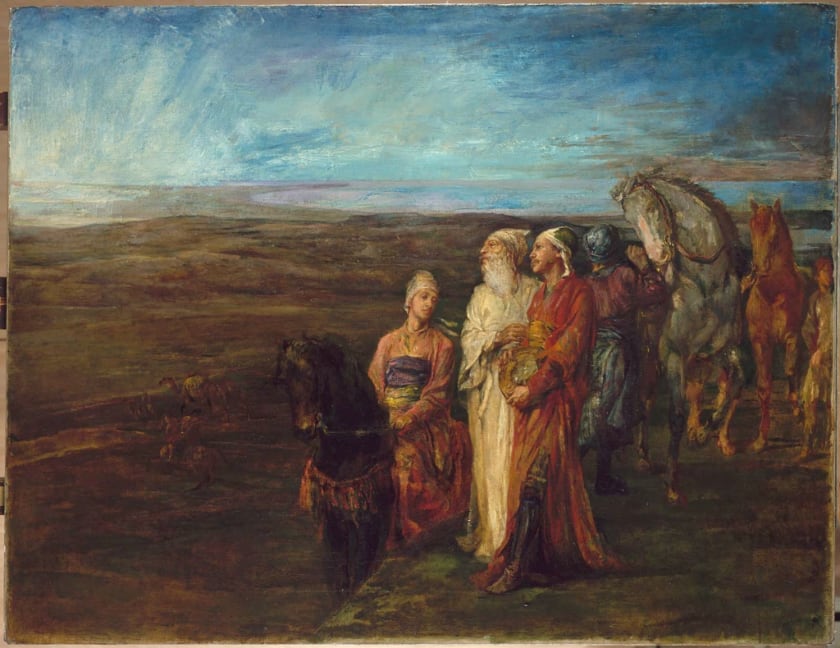
We tend to think of the Magi as three (although there were possibly more) men (though nothing says they were exclusively male) with long white beards — signifying age and wisdom. But I wonder. Deciding on a spur-of-the-moment Road Trip sounds more like the sort of thing young males would do.
So there are these young guys setting off on this trek across the sands In Search Of … Well, in search of what, exactly? Maybe it began as a whim, mere idle curiosity; or maybe they were bored and wanted to get out and see the world, following a distant star “because it was there.”
Whatever may have caused them to start their journey, one thing is certain: they became determined to finish it. The Magi didn't give up, continuing on in their quest even when the star disappeared from view.
And that’s when the story gets really interesting.
When they lost sight of the star, our travelers headed for Herod's palace in Jerusalem. It was a logical decision; after all, where else would you look for the “newborn king of the Jews,” but in the residence of the king of the Jewish people?
Now, as we know, the last thing Herod wanted was a new king: he was king, thank you very much, and — between toadying to Caesar and exterminating the competition (along with his critics) — he intended to remain king .… well, pretty much forever.
But Herod wasn’t king so much as he was “Caesar’s man in Jerusalem,” serving at the emperor’s pleasure. One disaffected bureaucrat, one lousy report to headquarters — worse: a popular “uprising of a new king”! — and that would be that. Herod would no longer retain the throne. He’d be lucky to retain his life.
So we can just imagine the reaction in the palace at the Magi’s announcement that a new king was on the horizon. It must have been like an ant hill in rising flood waters: alive with movement. Silk-clad feet rushing through the corridors, secret meetings in the gardens, whispered conversations by the splashing fountains, plots hatched in the cool and quiet alcoves…..
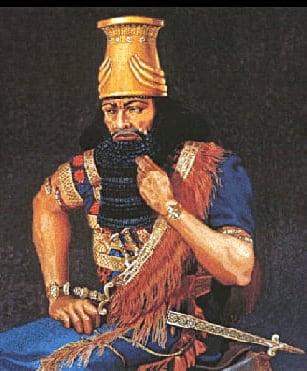 And there, in the midst of this blooming, buzzing confusion, sits Herod, positively vibrating with fear and suspicion. Slyly, this fox — as Jesus will later call him — assembles a committee to advise him; creating a handy group of scapegoats to shoulder the blame in case this event goes badly.
And there, in the midst of this blooming, buzzing confusion, sits Herod, positively vibrating with fear and suspicion. Slyly, this fox — as Jesus will later call him — assembles a committee to advise him; creating a handy group of scapegoats to shoulder the blame in case this event goes badly.
This committee of scholars and priests promptly comes to an agreement (that, in itself, convinces me that a Divine hand was at work). They tell Herod that an ancient prophet spoke of a great king arising from Bethlehem; it is there that this credible threat to his rule shall be found.
Curiously, Herod then secretly meets with the Magi. For a savvy politician he seems clueless here: after all of the palace gossip, the big committee meeting, and the arrival of these odd strangers, to imagine that this information hasn’t become public knowledge is just plain silly. But there it is.
Herod sends the Magi off to Bethlehem in search of the child, asking that they return with their findings so that he, too, may <ahem> “pay his respects” to the new king.
Now, back to our Magi.
They’ve spent at least a couple of days in the capital city, hanging out, looking around, listening and learning. If they’re smart as well as wise/learned, they will have gained a sense of the political landscape as well as the geographical one. Herod is cunning, deceitful, rich and well-connected, and very, very dangerous.
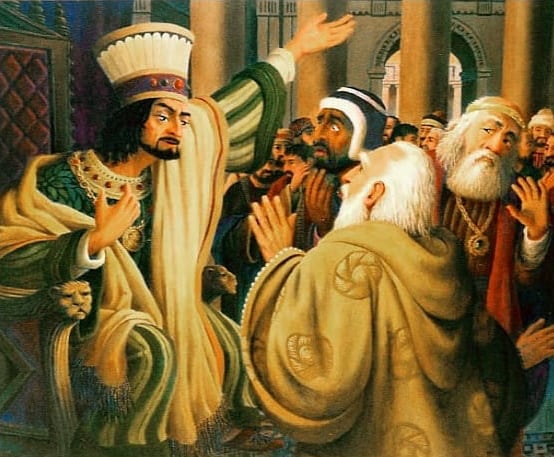
About this time our wise guys were probably beginning to regret their journey. When summoned into Herod's presence — secretly, so no one would know where they went if they disappeared? — it had to have been quite terrifying, and they must have breathed a sigh of relief when they walked out of the palace gates.
The Magi faced a choice: they could head straight home, leaving Herod and all of the drama and dangers of his kingdom behind — or they could continue on their quest. Their decision was crucial.
In that instant the travelers moved beyond mere knowledge to genuine wisdom: an understanding that transcends data — not ignoring it; contextualizing it. Wisdom comprehends a greater Truth: recognizing God at the center of all that is. Wisdom is the hope that inspires us, that lifts up our hearts despite uncertainties; it is the courage that draws us onward despite fears and threats; it is the Light in us that seeks our Source.
Before, their journey may have been a bit of a lark: a point of curiosity, an adventure, a road trip; but now it has changed. Now the Magi want to to find this newborn king for themselves; now they seek him not for novelty’s sake, but for their own sakes. Now they are called forth to come and see (that classic Gospel summons!): to come and see for themselves this Child foretold in the heavens.
It seems that they had lost sight of their heavenly guide — perhaps because they had blindly followed the road to Jerusalem in their certainty that it was the right way? — for now “the star they had seen at its arising” appears “there, ahead of them.” The star was now shining for them, leading them, and, with courage and faith, the Magi followed, “until it stopped over the place where the child was.”
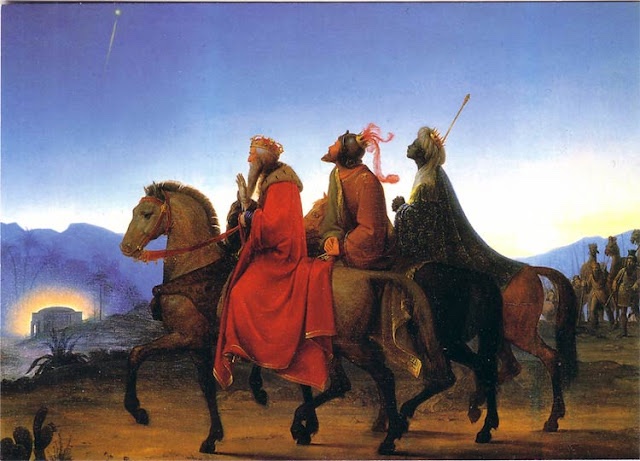
“When they saw that the star had stopped, they were overwhelmed with joy.”
Epiphany: a sudden apprehension or realization; from Greek epiphainein "to manifest, display, show off; come suddenly into view," epi "on, to" with phainein "to show" (from Proto-Indo-European root bha "to shine").
The Magi were overwhelmed with joy. They were delighted beyond delight; thrilled to the tips of their toes — at having arrived at a dinky, dusty town in the middle of no where.
That is Epiphany when the grace of God illuminates our understanding; when our senses are suddenly alive with an awareness of beauty, of peace, of gentle joy. “This,” our heart cries, “This is the Lord, the One my soul loves, the Light of my life.” It is a glimpse of heaven.
To see a world in a grain of sand
And a heaven in a wild flower
Hold infinity in the palm of your hand
And eternity in an hour.
~ Wm. Blake, Auguries of Innocence
Beyond lunar cycles and constellations and comets, there is the love that moves the sun and the stars. That is wisdom: the divine grace that gives meaning to knowledge: it calls for healing and hope and joy; it summons the best from all that we are and all that we do.
The Magi knelt down and paid him homage. Then, opening their treasure chests, they offered him gifts of gold, frankincense, and myrrh.
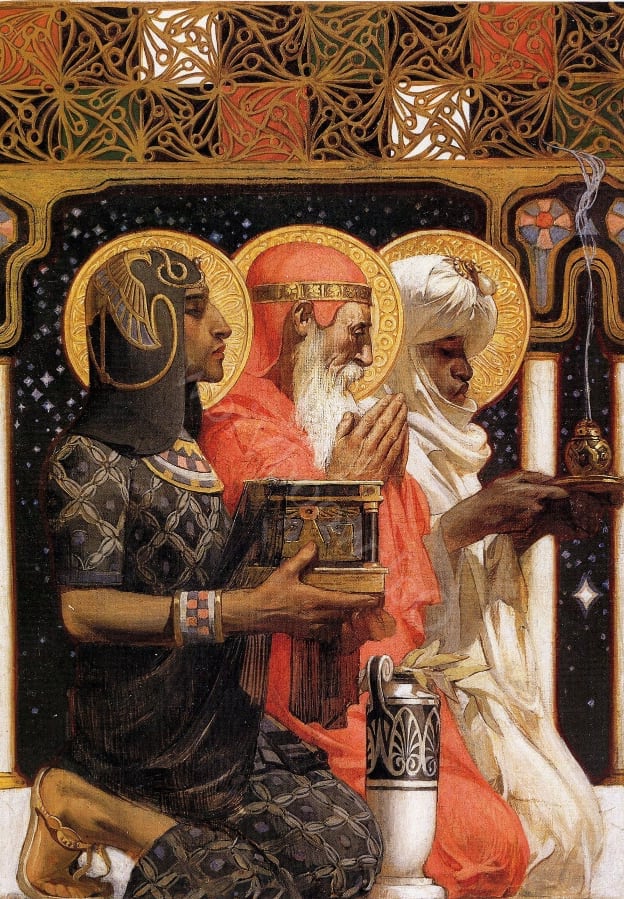
The Magi offered the Child all the gifts they had brought with them — but these were as nothing to the gifts they had received. They were now truly wise men.
And having been warned in a dream not to return to Herod, they left for their own country by another road.
With this, our wise travelers depart from the Gospel and ride off into history.
We do not know what happened next, though tales have been told giving their purported names, their homelands, their later lives — as missionaries, martyrs, priests, bishops, etc., etc. These say that the Magi became important, famous, even heroic.
Any of those may be true; with God, anything is possible. In my imagination I see them returning home so filled with delight, their hearts positively aflame with love, it was as if they simply glowed — the way the Torah describes Moses' face after encountering God. They carried the Light of Christ with them, and that was enough. They were enough.
It was enough for them to simply be: to bask in God's love, to rejoice in the circling stars, to delight in the scent of lemon blossoms, the taste of green olives, the sound of the owl's hoot and the dove's coo, the touch of a loved one…. It was enough to be a part of God's good creation and to enjoy it and to rejoice unceasingly.
This is not idleness or sloth, not the dazed stupidity of an opium eater; it is heavenly peace: it is resting in God, trusting in His love. It is a confidence that frees us from striving, frees us from the need to prove our intelligence, our skill, our righteousness, our refinement, our ferocity, our determination, our compassion, our strength, our courage, our work ethic — in short: whatever we use to try to prove our worth as a person. There is no need to justify our existence; we are beloved of God, and that is enough.
The ultimate grace is to know that we are the beloved of God; in that knowledge — in that wisdom — we are freed; freed from our own self-doubt and self-loathing, from our need for approval and accolades from others; we are free to be to be-come the most glorious be-ing that we were designed to be.
And so I cannot begin to guess just how those Magi grew in God’s grace after they returned to their own country. I only know that they did, and that it was wonderful, just as I know that you will continue to grow ever-more wonderful if you trust in the Lord Christ.
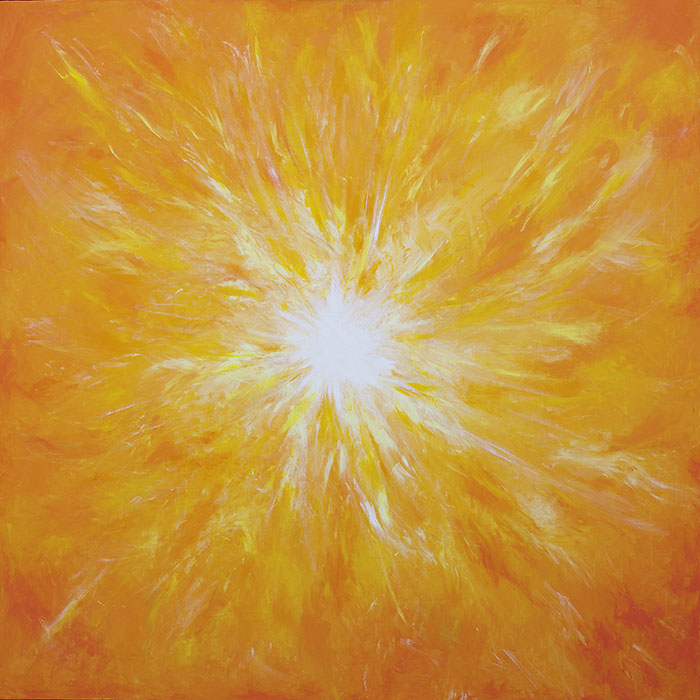
Christ’s glorious, redeeming, healing love abound,
Deborah ✝
Suggested Spiritual Exercise
Spend some time simply being. Bask in the warmth of God’s love.